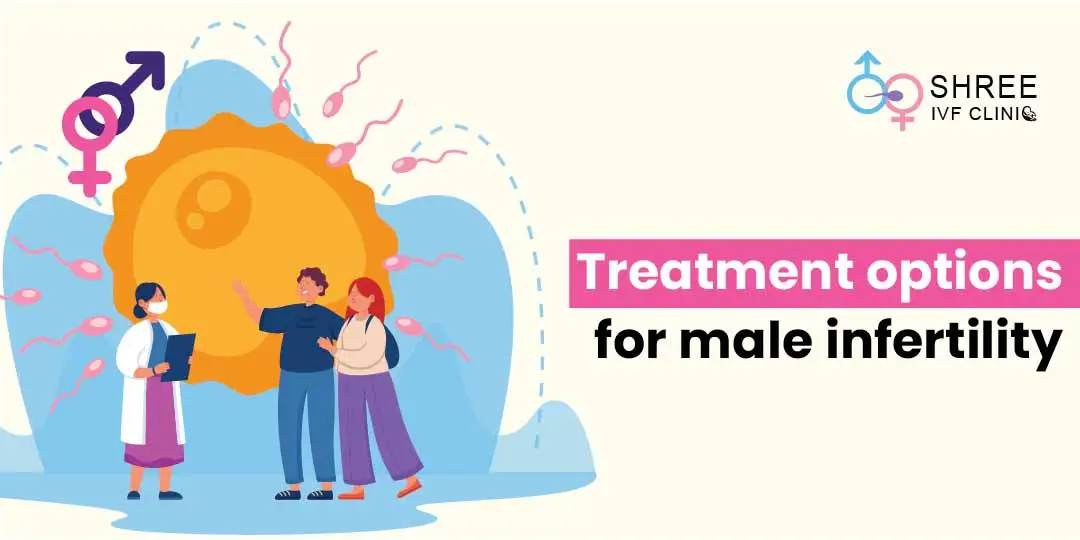How Can I Correct My Male Infertility?
UPDATED ON 25 OCT. 2022

AUTHOR
Dr Jay Mehta
Scientific Director & IVF Specialist with 10+ years of experience
TREATMENT
CONDITION
GET IN TOUCH ON
Are you and your partner struggling to conceive a child? Male infertility may be the issue. When it comes to infertility, males are often overlooked. Male infertility is just as common as female infertility. In fact, about 30% of all infertility cases are due to a male factor.
If you are having trouble conceiving and you think you may be suffering from male infertility, don’t despair. There are many ways to correct male infertility, so don’t give up hope.
Read this article for more information on
- Understanding the male infertility
- What are causes & sperm problems that causes male infertility
- Diagnosing the male infertility
- Treatment options : Surgical & Non Surgical
- Success rate of male infertility treatments
- Coping with Male Infertility
Don’t hesitate to seek help if you are having trouble conceiving – early diagnosis and treatment is the best way to achieve success.
Understanding the Male Infertility
The first step in correcting male infertility is to understand the problem. Male infertility is caused by a variety of factors, including low sperm count, poor sperm quality, blockages in the reproductive system, and health issues that affect the reproductive organs.
Also Read : How Common is Male Infertility?
What are some possible Causes & Sperm Problems of Male Infertility?
There are many different causes of male infertility. One of the most common causes is a low sperm count.
- Low Sperm Count
It means that there are fewer sperm present in the semen. This can be due to a variety of factors, including health issues, medications, smoking, and exposure to certain chemicals.
Also Read : How To Increase Sperm Count?
- Poor Sperm Quality
It means that the sperm are not healthy. They may be misshapen or have poor motility (the ability to swim). This can be caused by health issues, medications, smoking, and exposure to certain chemicals.
- Blockages in the Reproductive System
There may be a blockage that prevents the sperm from reaching the egg. This can be due to a varicocele (a condition that causes the veins in the testicles to swell), an infection, or scar tissue from surgery.
- Health issues that affect the reproductive organs
There are many health conditions that can cause male infertility, including diabetes,thyroid problems, HIV/AIDS, and celiac disease.
Diagnosing the Male Infertility
If you and your partner are struggling to conceive, it’s important to see a fertility specialist. A fertility specialist will be able to diagnose the cause of your infertility and recommend treatment options.
Also Read : Male Infertility Tests and Diagnosis?
Treatment Options: Surgical & Non Surgical
There are many different treatment options available for male infertility. Treatment will vary depending on the cause of your infertility
Surgical Treatments
There are several surgical treatments that can correct male infertility. These include
- Vasectomy reversal
This surgery is used to reverse a vasectomy. The surgeon will make an incision in the scrotum and remove the blockage that is preventing sperm from reaching the egg. Vasectomy reversal is successful in about 50-80% of cases.
- Microsurgical epididymal sperm aspiration (MESA)
This surgery is used to retrieve sperm from the epididymis (a long, coiled tube that stores and carries sperm). The surgeon will make a small incision in the scrotum and remove a section of the epididymis. The sperm will then be retrieved from the epididymis and used for in vitro fertilization (IVF). MESA is successful in about 70-80% of cases.
- Testicular sperm extraction (TESE)
This surgery is used to retrieve sperm from the testicles. The surgeon will make a small incision in the scrotum and remove a small piece of tissue from the testicle. The sperm will then be retrieved from the tissue and used for IVF. TESE is successful in about 50-70% of cases.
Non Surgical Treatments
There are several non surgical treatments that can correct male infertility. These include
- Oral medications
There are many different oral medications that can be used to treat male infertility. These include Clomiphene citrate, Gonadotropins, and Tamoxifen citrate. These medications work by stimulating the release of hormones that help to produce sperm. Oral medications are successful in about 10-20% of cases.
- Injectable medications
There are many different injectable medications that can be used to treat male infertility. These include Gonadotropins, Human chorionic gonadotropin (hCG), and Follicle stimulating hormone (FSH). These medications work by stimulating the release of hormones that help to produce sperm. Injectable medications are successful in about 10-20% of cases.
Assisted Reproductive Technique
- Intracytoplasmic sperm injection (ICSI)
This is a procedure that is used during IVF. A single sperm is injected into an egg and then the egg is implanted into the woman’s uterus. ICSI is successful in about 50-70% of cases.
Also Read : Does ICSI improve IVF success?
- Assisted hatching
This is a procedure that is used during IVF. The embryo’s outer layer (the zona pellucida) is thinned or removed to help the embryo hatch and implant into the woman’s uterus. Assisted hatching is successful in about 50-70% of cases.
- Intrauterine insemination (IUI)
This is a procedure in which sperm is inserted into the woman’s uterus through a catheter. IUI is successful in about 10-20% of cases.
- IVF
In vitro fertilization (IVF) is a procedure in which eggs are retrieved from the woman’s ovaries and fertilized with sperm in a lab. The embryo is then implanted into the woman’s uterus. IVF is successful in about 40-50% of cases.
Also Read : How to Choose the Best IVF Centre in Mumbai?

4,790+
379K+
” Every individual and couple’s journey is unique, and
finding the right solutions tailored to their specific
circumstances can make all the difference “
Male Infertility Treatment Cost in India
There are many factors that can affect the cost of male infertility treatment in Mumbai, India. The first is the city in which you live. Infertility treatment is generally more expensive in large cities than in smaller towns. However, in general, the average cost of treatment ranges from Rs. 15,000 to Rs. 1 lakh.
The second factor is the type of treatment you receive. The third factor is your insurance coverage. Some insurance plans cover infertility treatments, while others do not.
Finally, the success rate of your treatment will also affect the cost.
If you need multiple rounds of treatment before becoming pregnant, the costs will be greater than if you conceive after just one or two attempts.
However, regardless of these factors, there are many affordable options for male infertility treatment in Mumbai, India. With a little research, you should be able to find a clinic that fits your budget and your needs.
Success Rate of Male Infertility Treatments
The success rate of male infertility treatments varies depending on the cause of your infertility and the treatment options that are used. Treatment options with the highest success rates include surgery and IVF. The success rates of these treatment options range from 30-40%.
Treatment options with the lowest success rates include oral medications and IUI. The success rates of these treatment options range from 10-20%. If you are considering treatment for male infertility, it is important to speak with a fertility specialist to discuss your options and find the best treatment plan for you.
Coping up with Male Infertility
It can be difficult to cope with the diagnosis of male infertility. You may feel angry, sad, or helpless. You may also feel like you are less of a man. It is important to remember that you are not alone. There are many other men who are dealing with the same thing.
There are also many resources available to help you cope with your infertility. Support groups, therapy, and counseling can all be helpful. If you are struggling to cope with your infertility, please seek help from a professional.
Living with Male Infertility
If you have been diagnosed with male infertility, it is important to remember that you are not alone. There are many other men who are dealing with the same thing. There are also many resources available to help you cope with your infertility. Support groups, therapy, and counseling can all be helpful. If you are struggling to cope with your infertility, please seek help from a professional.
Infertility can be a difficult thing to deal with. If you need help coping with your infertility, please reach out to a fertility expert. There are many resources available to help you through this tough time. Remember, you are not alone!
AUTHOR
Dr Jay Mehta
Scientific Director & IVF Specialist with 10+ years of experience
TREATMENT
CONDITION
CALL US 24/7 FOR ANY HELP
GET IN TOUCH ON
Share Article on
Recommended Reading
How Long Can Sperm Live Inside the Female Body?
Sperm live inside the female body depends on a certain number of factors. sperm can survive inside female partner’s body is 5 days.
Difference between Primary & Secondary Infertility
In this blog, we’ll understand the difference between Primary & Secondary Infertility.
Understanding How Thyroid Affects Male Fertility
We’ll be discussing the effects of hypothyroidism (underactive) as well as hyperthyroidism (overactive).




